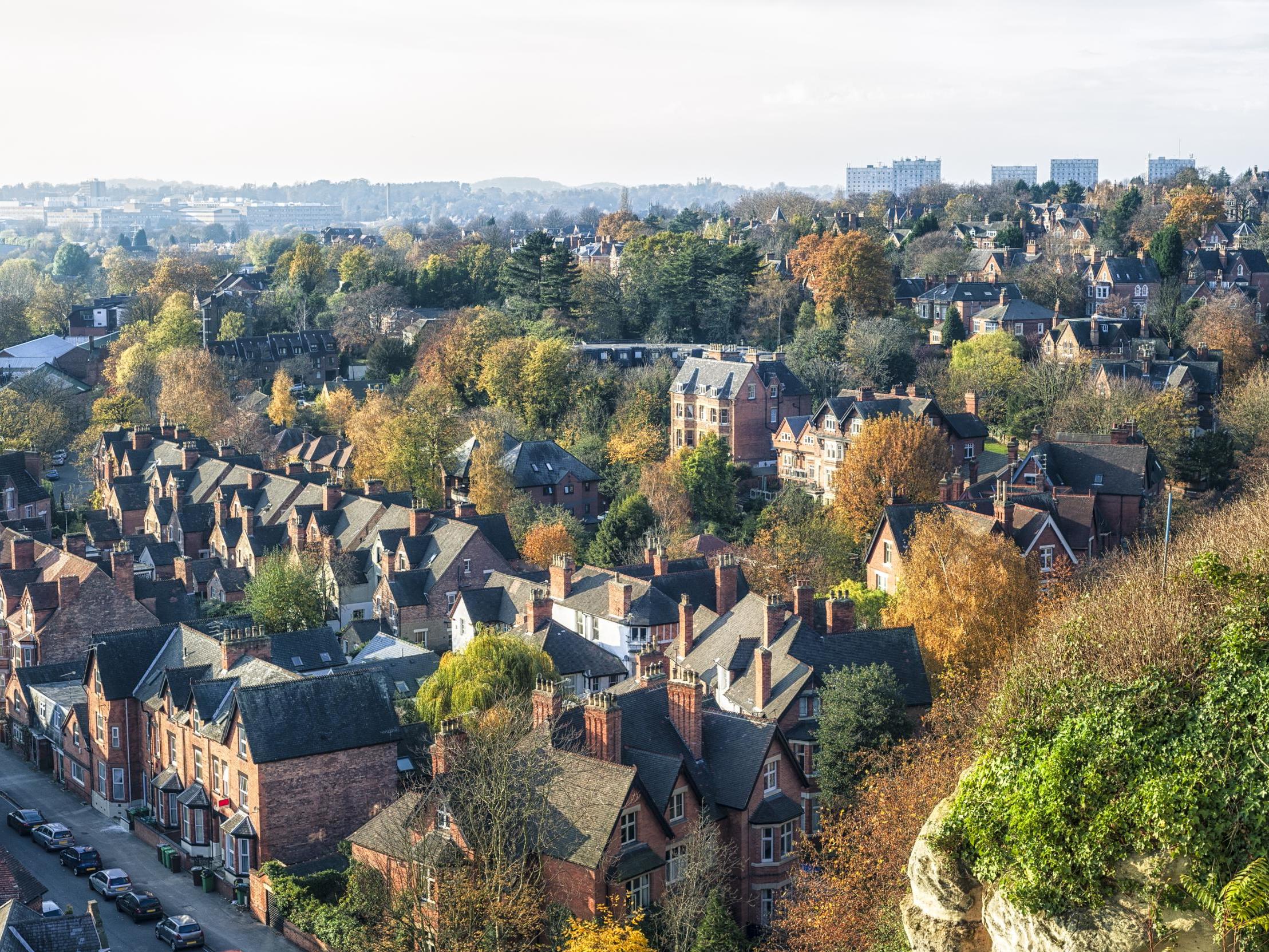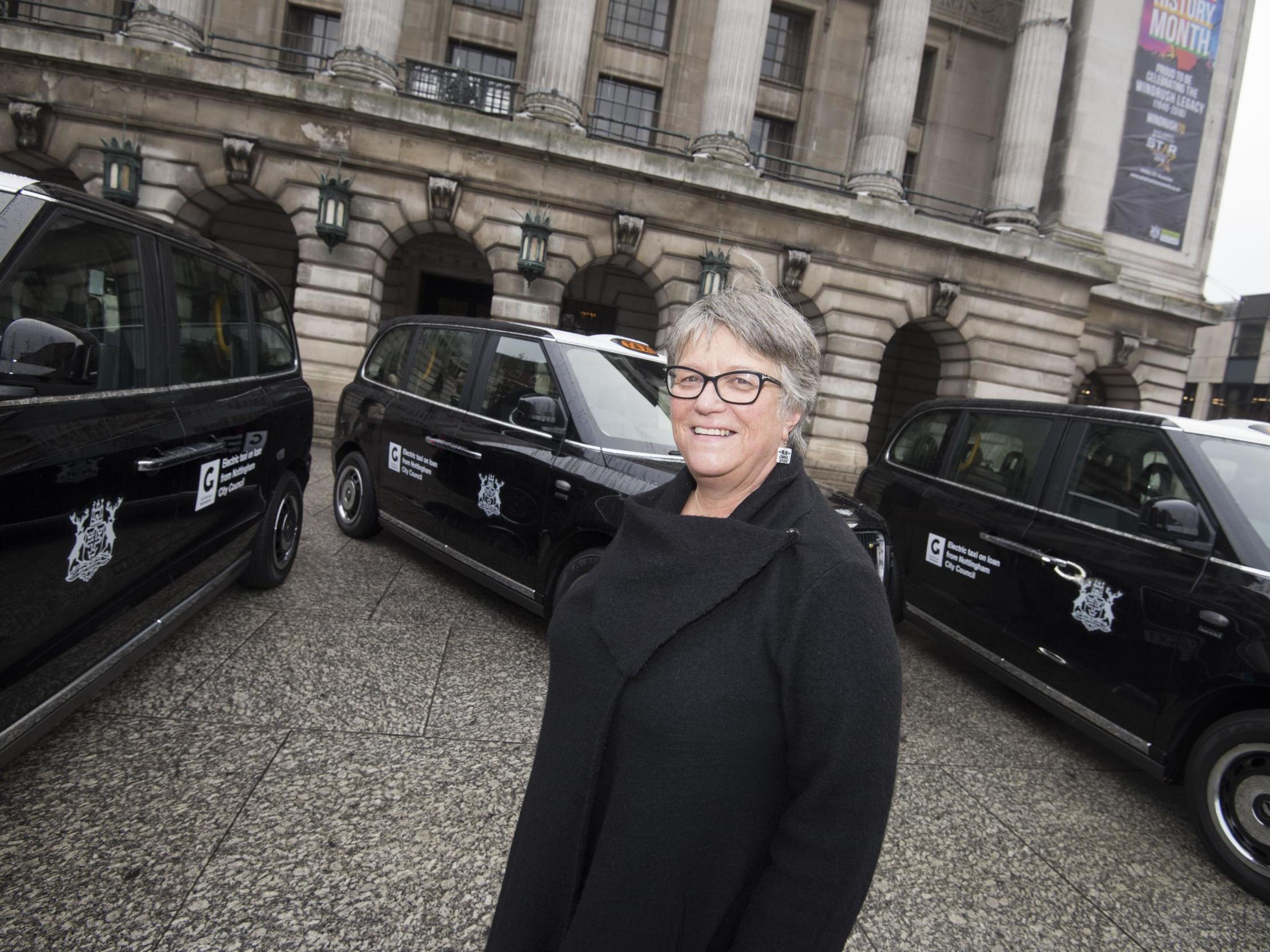How Nottingham is racing to be the UK’s first carbon neutral city
Transport, housing and energy use all being transformed in bid to hit zero emissions by 2028

When it was windy outside, Ernest Gregory used to sit in his Nottingham home and watch the draught blowing the curtains, even though the windows were shut.
“Some nights in winters, we’d put the heating right up,” the 78-year-old says. “But we’d still put our coats on just to stay warm.”
No longer. A series of schemes to transform the city’s 27,000 council homes into some of the greenest housing stock in the UK has seen the great grandfather’s 1970s maisonette installed with new outer cladding, net zero central heating and roof-top solar panels.
“Now, I put the radiators on for a couple of hours in the morning and it’s warm all day,” he says, sat with wife Gill, 77. “You can’t believe how nice it is not to get out of bed and start shivering.”
These refurbishments form a key plank of what is being called the most ambitious climate change strategy ever undertaken by a UK authority.
Under a draft council plan published this week and going out to consultation on Monday, Nottingham has declared its intention to become the country’s first ever carbon neutral city.
Transport, energy use, waste management and housing here will all be transformed in a bid to hit zero emissions by 2028 – a full 22 years before the government’s country-wide target.
“If it stands still, we’re going to put a solar panel on it,” says Sally Longford, the Labour city council’s deputy leader and cabinet member for energy, environment and democratic services. “And, if it moves, we’re going to do everything we can to make sure it moves on clean energy.”
If it sounds ambitious, Longford agrees. “But the world is in a climate crisis,” she tells The Independent at her home in the city’s Wollaton area. “It’s no good hoping it goes away. Ambitious is exactly what we have to be.”

Nottingham, of course, is not the only city aiming to go carbon neutral well ahead of the government’s 2050 deadline.
To some extent, there is a race to be first.
Edinburgh, Bristol and Glasgow have all announced they want to get there by 2030, while York and Birmingham have published proposals to turn their city centres virtually car free.
But it is here in the Queen of the Midlands that plans are perhaps furthest progressed.
Already the city powers 5,000 homes and more than 100 businesses through energy created from its own waste; is building a network of 300 charge points to encourage use of electric vehicles; and has established a bus and tram system so effective that 40 per cent of all journeys are now made on public transport – more than any British city outside London. For good measure, some 178 of those buses run off either electric or bio gas.
The council has cut its own energy use by some 40 per cent over the last decade and installed 4,000 solar panels across its own buildings; while also setting up the in-house Robin Hood Energy company to supply 130,000 customers with entirely renewable power.
That ongoing refurbishment of council homes, meanwhile, has seen 40,000 efficiencies made to an estimated 20,000 properties. Some 327 are currently undergoing the country’s first ever Energiesprong retrofit – a pioneering Dutch renovation which cost £80,000 a house but which makes buildings almost entirely carbon neutral (and, for what it’s worth, astonishingly striking looking).
So far ahead of the game is the city, that it has already met its (self-set) 2005 target of reducing greenhouse gases by a quarter by 2020. It smashed it four years ago. While other urban centres have been instructed to create clean air zones to reduce pollution, Nottingham has not. The air here, the government has decided, is clean enough.
“We’ve not just been talking about climate action,” says Longford, who has six solar panels on the roof of her own home and drives an electric car “We’ve got on and done it. And that’s not always been universally popular, but I think we have been proven right.”
The 65-year-old is referring there to the city’s once controversial Workplace Parking Levy scheme. Introduced in 2012, this essentially taxed every business in the city centre which had more than 11 private car parking spots and then pumped that money – £61m and counting – into building cycling routes, establishing eco-lanes and improving the 20-mile tram network.
“It was called anti-car at the time and we got a lot of flak,” says Longford. “But it has made Nottingham far healthier and less congested. We were ahead of the curve.”
Concerns that businesses would leave the city because of the levy were never realised. Rather, there has been a net increase of almost 25,000 jobs since it was introduced, according to council figures.
So, would Nottingham ever now ban cars? “I don’t think we need to consider that because we’ve reduced journeys [by seven per cent] through other actions,” says Longford.

All the same, the city now intends to go further and faster to bring emissions to zero.
The new carbon neutral plan combines big infrastructure proposals – such as exploring the potential for heating homes with warm water extracted from the area’s disused mines – with more prosaic everyday changes.
Under one initiative being considered, Nottingham could become one of the first councils in the country to ask residents to separate their food waste – which would then be turned into biogas for the city’s buses. In another, school kitchens will be advised and potentially rewarded for sourcing local ingredients to reduce food miles. Some 50,000 trees are to be planted across the city to suck up emissions that cannot be stopped.
Yet, crucially perhaps, the plan – which also advocates increased pedestrianisation and promises a greener and largely electrified taxi fleet by 2025 – seeks to integrate this clean thinking into every single action taken in the city.
“The key thing is to embed this into everything the council does so that potential environmental impact feeds into the decisions we make across every department,” says Jonathan Ward, principle energy policy officer.
This, it is said, is why there is no separate budget for all this stuff.
The council has become adept at winning green grants from both central government and Europe – such as one which has allowed it to offer grants for workplace showers to encourage more cycling. But it does not ring-fence a pot of money labelled “saving the planet”. Rather departments are expected to prioritise the environment while making business cases for new projects, strategies and budgets.
“When they’re done right,” says Ward, “projects which reduce emissions almost always save money in the end. If nothing else, going carbon neutral is a way of making long term financial savings.”
Perhaps, most importantly, the city as a whole seems on board with the new plan.
In a rare display of unity, everyone The Independent speaks to – from students to shoppers, from Extinction Rebellion activists to the local chamber of commerce – applauds the aspiration. Few, it seems, want to be on the wrong side of history.

“It’s bold and it’s comprehensive,” says Etienne Stott, the city’s Olympic gold medal-winning canoeist who was last year arrested during Extinction Rebellion protests in London. “What’s especially impressive is there are reviews within the plan so there’s no reason, with public support, why that 2028 date couldn’t be brought forward as momentum gathers.”
Is it ambitious enough? He thinks it is. “But we need support from central government,” the 40-year-old says. “It’s fine Nottingham doing its bit as a small unit but there must be leadership from Westminster.”
He gives an example of the city attempting to recycle more waste packaging. “But it’s difficult because such packaging varies so widely,” he says. “The government needs to step in and standardise it so councils can more easily deal with it.”
At the East Midlands Chamber of Commerce, meanwhile, they also welcome the aspirations – although stressing that challenges lay ahead.
“The chamber is fully supportive,” says chief executive Scott Knowles while pointing out that the region’s companies should also play their own role in making themselves carbon neutral while possible.
But he adds: “In any such transition, businesses must be supported. Our members tell us that one of their biggest concerns is the cost of energy and the security of supply while reducing carbon emissions could provide different challenges.”
All the same, even given such potential issues, there appears now to be a window of opportunity for the city to push ahead.
Back with Jonathan Ward, he says that he believes that, with tragedies exacerbated by climate change become increasingly common and following David Attenborough’s rallying cry this week, public support has never been so high for seeing emissions cut.
“There is a lot of doom around about this and there’s no doubt we are at the point of emergency,” he says. “But I think there’s also reason to be optimistic. There’s now a consensus that action needs to be taken. It’s our job to make the most of that and drive these changes on.”
Join our commenting forum
Join thought-provoking conversations, follow other Independent readers and see their replies
Comments
Bookmark popover
Removed from bookmarks